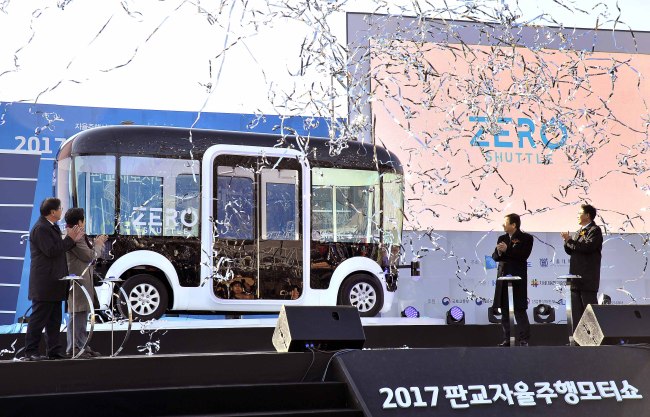PANGYO, Gyeonggi Province -- With companies and countries worldwide striving to gain an upper hand in self-driving vehicle technology, South Korea on Thursday unveiled its first fully automated shuttle dubbed Zero Shuttle.
The level-five Zero Shuttle is a 12-passenger autonomous vehicle that will begin test runs in Gyeonggi Province starting in December.
Automated vehicles are classified from level zero to five by the Society of Automotive Engineers, with level five referring to full automation in which there is full time performance by an automated driving system of all aspects of the dynamic driving task under all roadway and environmental conditions.
The unveiling took place at the Pangyo Autonomous Motor Show 2017, the world’s first motor show for self-driving vehicles, at Pangyo, south of Seoul.
 |
South Korea’s first fully automated shuttle Zero Shuttle is unveiled at the Pangyo Autonomous Motor Show 2017. (PAMS 2017) |
“Data collected during the test run will be shared with related research centers and industry players for the development of driverless technology,” Gov. Nam Kyung-pil of Gyeonggi Province said during the PAMS 2017 forum at the Creative Economic Valley in Pangyo.
“Global leaders are those who suggest a standard, and I believe the Zero Shuttle and Gyeonggi Province’s Pangyo Zero City will suggest a standard for future mobility and the city’s landscape.”
Pangyo Zero City is a test bed for driverless vehicle that covers 432,000 square meters of land. It is scheduled to complete construction by the end of 2019.
Two units of the Zero Shuttle will follow a 5.5-kilometer circular route at speeds of 25 kph connecting Pangyo Station and Pangyo Zero City from next month.
Headed by Yi Kyong-su of the Advanced Institutes of Convergence Technology, the shuttle will run on Korean mobile carrier KT’s Long Term Evolution and wireless access for vehicle environments, the company said.
The company will also monitor traffic information observed through the vehicle-to-everything network, and suggest solutions to problems.
Earlier this week much spotlight was given to a automated shuttle introduced in Las Vegas, which crashed just 10 minutes into operation.
Developed by transportation company Keolis, French manufacturer Navya and insurer AAA, the shuttle carrying eight people failed to react to an approaching truck.
By Kim Bo-gyung (
lisakim425@heraldcorp.com)








